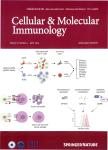Effect of Protein Kinase C on Proliferation and Apoptosis of T Lymphocytes in Idiopathic Thrombocytopenic Purpura Children
Effect of Protein Kinase C on Proliferation and Apoptosis of T Lymphocytes in Idiopathic Thrombocytopenic Purpura Children作者机构:Department of Microbiology and Immunology Guangdong Medical College Zhanjiang Guangdong 524023 China. wuchlin@***
出 版 物:《Cellular & Molecular Immunology》 (中国免疫学杂志(英文版))
年 卷 期:2005年第2卷第3期
页 面:197-203页
核心收录:
学科分类:1002[医学-临床医学] 100202[医学-儿科学] 10[医学]
基 金:This work was supported by Guangdong Natural Science Foundation(Society Development Domain No:200424)
主 题:ITP PKC proliferation apoptosis T lymphocyte
摘 要:It is well-documented that T lymphocyte proliferation and apoptosis are abnormal in idiopathic thrombocytopenic purpura (ITP) children. However, the underlying regulation mechanisms especially in terms of signal transduction remain unknown. In this paper, we reported the changes of protein kinase C (PKC) activity in peripheral blood T lymphocytes and the effect of PKC on T lymphocyte proliferation and apoptosis. We demonstrated that in ITP children, the activator (PMA) and inhibitor (H-7) of PKC affected on T lymphocyte proliferation and apoptosis dramatically, but they altered little in healthy children. PKC activity was significantly enhanced in ITP children together with an increased expression of FasL on CD3^+ T, CD4^+T and CD8^+T cells, resulting in a positive correlation between PKC activity and the expression of FasL on T cells. While the PKC activity and the platelet count were negatively correlated. Taken together, our findings suggest that the PKC activation may enhance T lymphocytes activity, suppress T cell apoptosis and be involve in thrombocytes damage as a mechanism related to immune pathogenesis of ITP. Cellular & Molecular Immunology. 2005; 2(3): 197-203.



